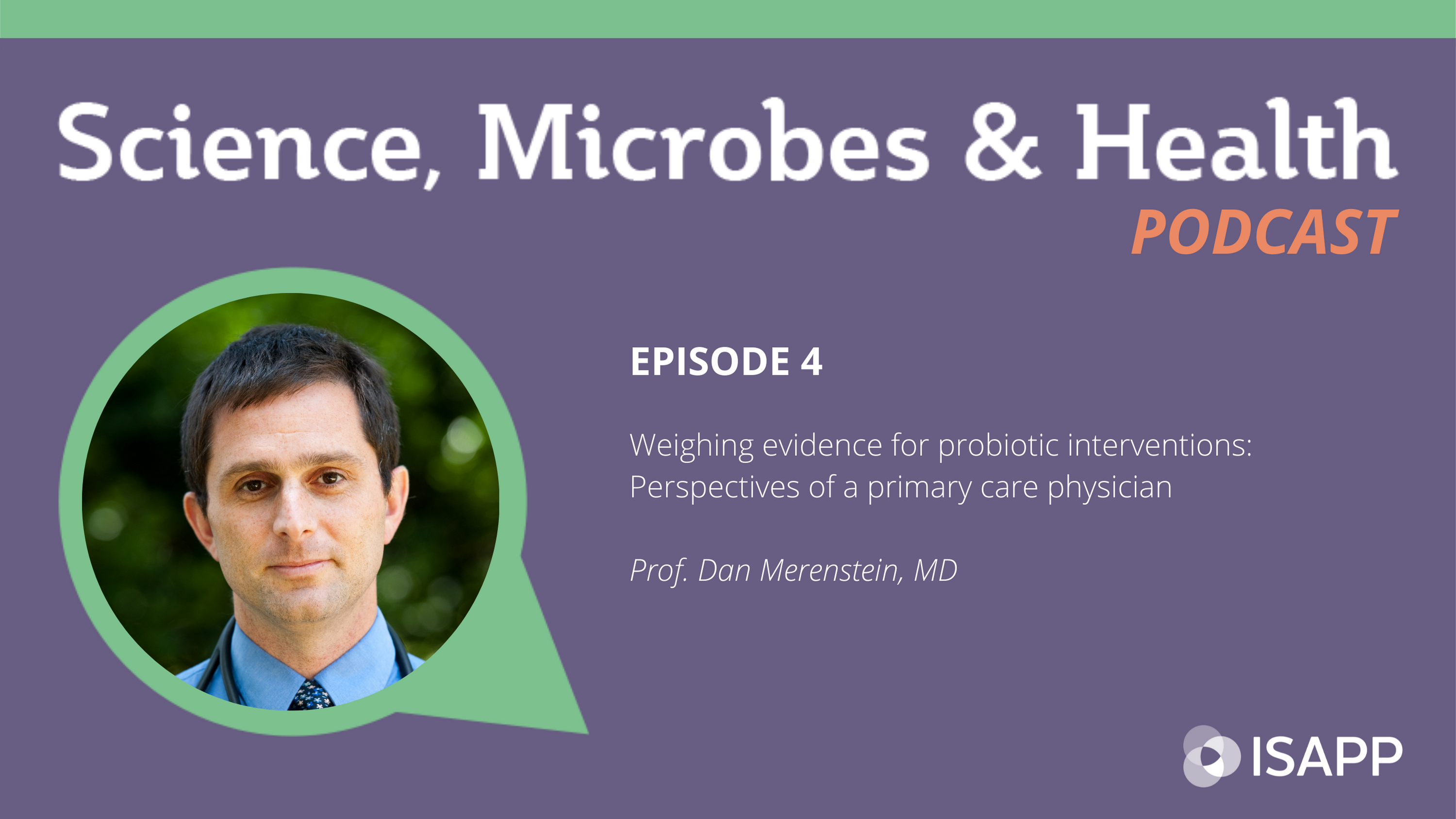Episode 4: Weighing evidence for probiotic interventions: Perspectives of a primary care physician
Podcast: Play in new window | Download
Subscribe: Apple Podcasts | Spotify | RSS
The Science, Microbes & Health Podcast
This podcast covers emerging topics and challenges in the science of probiotics, prebiotics, synbiotics, postbiotics and fermented foods. This is the podcast of The International Scientific Association for Probiotics and Prebiotic (ISAPP), a nonprofit scientific organization dedicated to advancing the science of these fields.
Weighing evidence for probiotic interventions: Perspectives of a primary care physician, with Prof. Dan Merenstein, MD
Episode summary:
In this episode, the ISAPP host Prof. Dan Tancredi discusses evidence for probiotic interventions with Prof. Dan Merenstein, MD, a family medicine researcher based at Georgetown University. They discuss what it means to practice evidence-based medicine, and what kind of evidence clinicians should look for when deciding whether an intervention is appropriate. Prof. Merenstein shares how probiotic evidence has strengthened in the past few decades, and gives tips on what to look for in a probiotic intervention study.
Key topics from this episode:
- What is evidence-based medicine, and why is it important to practice it? Evidence-based medicine provides proper care for patients at the appropriate time by focusing on the existing evidence provided by clinical studies.
- What is evidence, and how do we obtain a high level of evidence for probiotics? Evidence should come from well-designed clinical studies. Animal and in vitro studies provide supportive preclinical information and mechanistic insights.
- The quality of probiotic research has improved in recent years. Compared with decades ago, studies are more likely to be high quality and more likely to be properly-powered. Such studies have provided a clearer sense of the circumstances under which probiotics may – or may not – provide health benefits.
- What is the proper way to report clinical trials in the probiotic field? Focus on the rules for conducting a clinical trial: for example, CONSORT (see below). Compliance is also important for good outcomes.
- How can a clinician evaluate if a patient should use an intervention? The focus should be on the evidence for each intervention, the potential harm of the intervention, and the positive and negative outcomes.
- Evidence-based medicine also needs to account for regional differences and where the clinical studies have been performed. Evidence about probiotic effects needs to account for microbiome differences and lifestyle differences between countries.
- For which indications do we now have actionable evidence for probiotic use?
- Use of certain probiotics together with antibiotic treatment to prevent antibiotic-associated diarrhea
- Use of an L. reuteri strain to reduce crying time for infants suffering from colic
- Certain probiotics can help prevent traveler’s diarrhea or treat acute pediatric infectious diarrhea.
- Probiotics to help with endpoints such as weight loss and metabolic syndrome, for autism and gut-brain indications, for skin conditions such as eczema and acne, and inflammatory bowel disease are active areas of research and soon scientists will have more answers.
- Probiotic research is improving. Patients are using probiotics, and they are aware of the benefits of probiotics – Prof. Merenstein estimates that 80% of his patients are taking a probiotic. The job of the doctor is to get them to use probiotics in an evidence-based manner.
Episode links:
CONSORT (Consolidated Standards of Reporting Trials) establishes a well-accepted, evidence-based, minimum set of recommendations for reporting randomized trials.
IPDMA (individual patient data meta-analysis) – see this Sung et al. paper on infantile colic and L. reuteri
BB12: Bifidobacterium animalis subsp. lactis BB-12, a well-studied probiotic. See this paper.
A priori: without prior knowledge
Additional resources:
About Prof. Dan Merenstein:
Dr. Daniel Merenstein is a Professor with tenure of Family Medicine at Georgetown University, where he also directs Family Medicine research. Dr. Merenstein has a secondary appointment in the undergraduate Department of Human Science, in the School of Nursing and Health Studies. Dr. Merenstein teaches two undergraduate classes, a research capstone and a seminar class on evaluating evidence based medical decisions. He has been funded by the NIH, USDA, Foundations and Industry, for grants over $100 million. Dr. Merenstein is the President of the board of directors of the International Scientific Association of Probiotics and Prebiotics.
The primary goal of Dr. Merenstein’s research is to provide answers to common clinical questions that lack evidence and improve patient care. Dr. Merenstein is a clinical trialist who has recruited over 2,100 participants for 10 probiotic trials since 2006. He is an expert on probiotics, antibiotic stewardship in outpatient settings and also conducts HIV research in a large women’s cohort. He sees patients in clinic one day a week.















